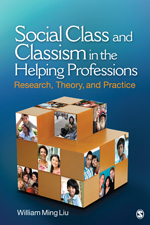Preface
Acknowledgments
Definition and Focus
The Importance of Social Class in the Helping Professions
Research
The Helping Professions' Poor Understanding of Social Class and Classism
Sociology's Impact on the Helping Professions
Social Class, Socioeconomic Status, Social Status, and Classism
Social Class and Classism Multicultural Competencies
Conclusion and Summary
The Context of Social Class and Classism
The Social Class Health Gradient
Social Class and Mental Health
Implications for Practice
Conclusions and Summary
Problems With Current Methods for Understanding Social Class
Categorizing Social Class
How Is Categorizing Accomplished?
Moving Toward Subjectivity of Social Class and Classism
Implications for Practice
Conclusion
The Context of Economic Cultures
Social Class and Classism Consciousness
Implications for Practice
Conclusion
Counseling, Psychotherapy, and Helping Professionals
Social Class and Classism to Inform Our Work With Clients
Empirically Validated and Supported Treatments and Common Factors
Understanding Our Own Biases and Social Class Experiences
Career Counseling
Using Social Class-Based Interventions in Counseling
Implications for Practice
Conclusion
Social Class and Classism and Psychological Development
Quality of Child Care
Sleep Habits
Parent and Child Relationships
Impact of Media and Television
Social Class and Classism Traumas
Into Adulthood
Implications for Practice
Conclusion
Greed, Materialism, and Affluence
Consumption and Being Healthy
Materialism and Consumerism
Other Forms of Commodification and Consumerism
Consumerism
Affluence and Mental Health
Implications for Practice
Conclusion
How People Make Meaning of Poverty and Inequality
Racism
Economic Resources, Economic Privilege, Economic Entitlement
The Psychology of Privilege and Entitlement
Classisms
White Trashism
Implications for Practice
Conclusion
Training and Education
Upward Mobility Bias
Becoming Social Class and Classism Competent
Using the Social Class Worldview Model (SCWM-R) as a Training Tool
Training Experiences and Supervision
Privilege and Power
Conclusion
Definitions and Contexts of Social Justice, Advocacy, and Empowerment Work
Definitions
Social Justice and Social Class and Classism
Advocacy
Empowerment
Conclusion
References
Index
About the Author

